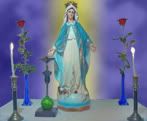
It is sad to know that the Feast of All Saints is understood differently be so many people especially by Catholics. I really don't know what they think about this feast but for clarification, I give this short background about this feast.
All Saints' Day (also called All Hallows or Hallowmas), often shortened to All Saints, is a feast celebrated on November 1 in Western Christianity, and on the first Sunday after Pentecost in Eastern Christianity in honour of all the saints, known and unknown. In terms of Roman Catholic theology, the feast commemorates all those who have attained the beatific vision in heaven, while the next day, All Souls' Day, commemorates the departed faithful who have not yet been purified and reached heaven.
In the early Church, Christians would celebrate the anniversary of a martyr's death for Christ (known as the saint's "birth day") by serving an All-Night Vigil, and then celebrating the Eucharist over their tomb or the shrine at their place of martyrdom. In the fourth century, neighbouring dioceses began to transfer relics, and to celebrate the feast days of specific martyrs in common. Frequently, a number of Christians would suffer martyrdom on the same day, which naturally led to a joint commemoration. In the persecution of Diocletian the number of martyrs became so great that a separate day could not be assigned to each. But the Church, feeling that every martyr should be venerated, appointed a common day for all.
All Saints' Day (also called All Hallows or Hallowmas), often shortened to All Saints, is a feast celebrated on November 1 in Western Christianity, and on the first Sunday after Pentecost in Eastern Christianity in honour of all the saints, known and unknown. In terms of Roman Catholic theology, the feast commemorates all those who have attained the beatific vision in heaven, while the next day, All Souls' Day, commemorates the departed faithful who have not yet been purified and reached heaven.
In the early Church, Christians would celebrate the anniversary of a martyr's death for Christ (known as the saint's "birth day") by serving an All-Night Vigil, and then celebrating the Eucharist over their tomb or the shrine at their place of martyrdom. In the fourth century, neighbouring dioceses began to transfer relics, and to celebrate the feast days of specific martyrs in common. Frequently, a number of Christians would suffer martyrdom on the same day, which naturally led to a joint commemoration. In the persecution of Diocletian the number of martyrs became so great that a separate day could not be assigned to each. But the Church, feeling that every martyr should be venerated, appointed a common day for all.
A commemoration of "All Martyrs" began to be celebrated as early as the year 270, although no specific month or date is mentioned in existing records. The first trace of a general celebration on a specific day is attested in Antioch on the Sunday after Pentecost There is mention of a common day in a sermon of St. Ephrem the Syrian (373), and the custom is also referred to in the 74th Homily of St. John Chrysostom (†407), who speaks of a "feast of martyrs of the whole world." As early as 411, there is found among the Chaldean Christians a general commemoration of all Confessors (Commemoratio Confessorum), celebrated on the Friday after Easter.










No comments:
Post a Comment